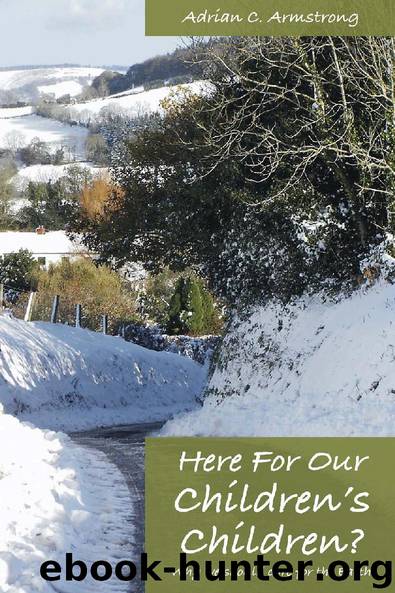Here For Our Children's Children? by Adrian C. Armstrong

Author:Adrian C. Armstrong
Language: eng
Format: epub
Tags: Environment, environmentalism, environmental ethics, civilisation, civilization, hedonism, utilitarianism, consequentialism, theism, religion, democracy, globalisation, globalization, ecology, rationalism, Darwinism, Darwin, scientism, ecofeminism, humanity, anthropology, natural world, natural law, politics, economics, economy, sustainability, animal rights, activism, Gaia, agriculture, countryside, population, climate change
ISBN: 9781845406226
Publisher: Andrews UK Limited 2016
Published: 2016-04-05T00:00:00+00:00
These objections suggest to Palmer that “stewardship” was a convenient label that was in vogue in the 1950s in other (notably financial) contexts, which was then adopted for use in a new context. She argues that a new term, free from some of the old associations would have been more appropriate. No alternative for the term stewardship has appeared, and it has now passed irrevocably into common usage. It has thus become part of the official language of the state; with the UK government for example labelling its current agri-environment grant scheme “Environmental Stewardship” (DEFRA, 2005). So despite the misgivings, as no alternative term has come into common usage, it seems that the language of Stewardship is irrevocably embedded in environmental language.
Sustainability
Sustainability has been used in many contexts, but has increasingly become the focus for much talk about land management. The many uses of the term are reviewed in Attfield (2003, chapter 6.) The language of sustainability has become important in four contexts: the use of resources, the agricultural context, the development context, and popular usage.
Sustainability is often used in the context of the management of resources, and is particularly used to suggest that resources need to be harboured and maintained. Even non-renewable resources can be used in a way that is described as sustainable, by implying that the current rate of consumption will not exhaust the supply, but can be sustained into the foreseeable future. Of course, no finite resource can be exploited forever, and there must therefore be a limit to the use of such resources. The mineral resources of the Earth are a classic example. However, it is possible to identify ways in which they can be used sufficiently slowly that future usage will not be excessively compromised by current consumption. It is reasonable to allow for technological advance that might replace critical resources in the future, or allow for identification of additional new locations of the resource, without blindly following the path of Promethean optimism.
Sustainability has also become an important word in the agricultural field. This use came to fore in the American context, following the experience of the dust-bowl years of the 1930s (see Lowdermilk, 1953). In this context, sustainability can be simply a technical issue: that of using the land correctly. It can then be seen in technical terms such as the adoption of correct cultivation practices to prevent erosion, the use of chemicals to maintain soil fertility, the appropriate use of machinery to prevent damage to soil structure, and so on. The term has thus come to cover a wider definition, and includes the use of the land system, even including both the wild life and the human life. Sustainable agricultural systems are thus seen as less intensive than current “industrial” agriculture, and may include traditional agricultural practices. It is also remarkably close to the “Land Ethic” of Leopold, which will be discussed in Chapter 5, pp. 75–77.
The third major use of the term sustainable is applied to Third World development. The term,
Download
This site does not store any files on its server. We only index and link to content provided by other sites. Please contact the content providers to delete copyright contents if any and email us, we'll remove relevant links or contents immediately.
| Anthropology | Archaeology |
| Philosophy | Politics & Government |
| Social Sciences | Sociology |
| Women's Studies |
Born to Run: by Christopher McDougall(7128)
The Leavers by Lisa Ko(6948)
iGen by Jean M. Twenge(5417)
Sapiens by Yuval Noah Harari(5372)
Spare by Prince Harry The Duke of Sussex(5197)
The Kite Runner by Khaled Hosseini(5181)
Machine Learning at Scale with H2O by Gregory Keys | David Whiting(4313)
Bullshit Jobs by David Graeber(4192)
Never by Ken Follett(3958)
Goodbye Paradise(3811)
Livewired by David Eagleman(3775)
Fairy Tale by Stephen King(3400)
A Dictionary of Sociology by Unknown(3085)
Harry Potter 4 - Harry Potter and The Goblet of Fire by J.K.Rowling(3074)
The Social Psychology of Inequality by Unknown(3031)
The Club by A.L. Brooks(2926)
Will by Will Smith(2922)
0041152001443424520 .pdf by Unknown(2846)
People of the Earth: An Introduction to World Prehistory by Dr. Brian Fagan & Nadia Durrani(2739)
